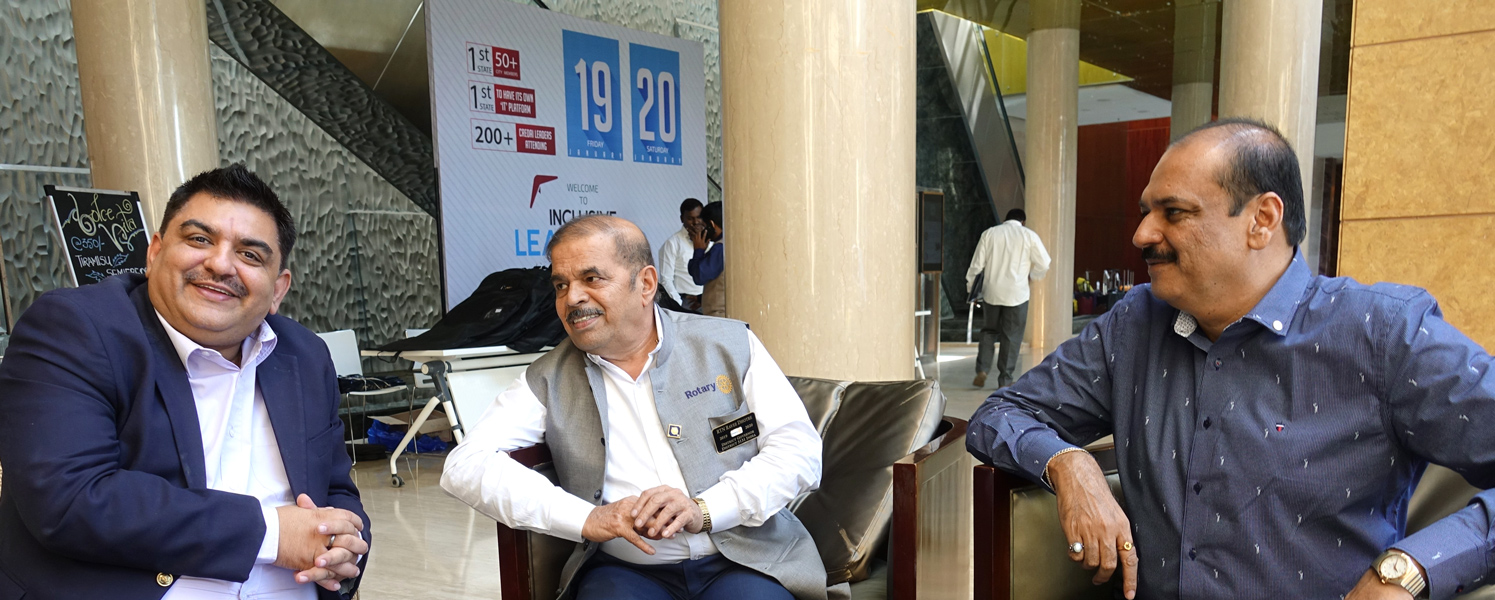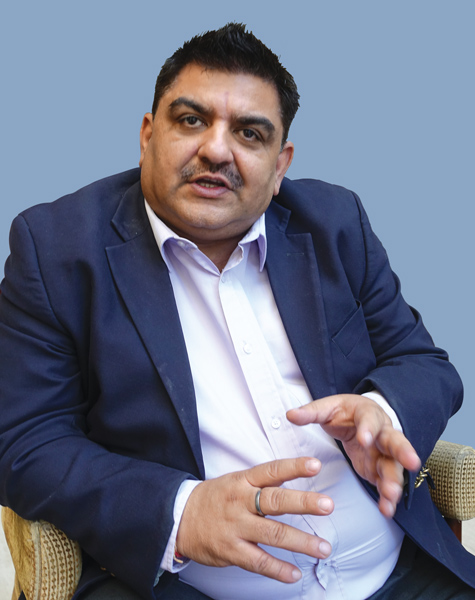Where Rotary is more than a preferred partner
We now involve Rotary in every programme we do in e-learning,” says Anubhav Kapoor, Company Secretary and Head-Corporate Sustainability at Tata Technologies, Pune.
So would you say Rotary is your trusted partner, I prompt him, during an interview in Pune. “Oh, I’d say they are much more than that. Over 5 to 6 years of association, they have become our friends, philosophers and guides,” is his response.
His euphoria can be gauged from the fact that over the last four years Tata Technologies has pumped in “around $1 million in Rotary’s e-learning programme in Maharashtra schools, giving over 1,000 e-learning kits in over 700 schools. And what I like the best about this project is the simplicity with which it is being implemented in our schools, particularly those in rural areas,” he adds.
Tracing the genesis of the relationship with Rotary, Kapoor says that six years ago, in a strategy meeting and planning the company’s growth path over the next five years, one goal put forth was that Tata Technologies should become a $1 billion company by then. “We then had a revenue of $400 million.” As the company basically provides engineering solutions, “we found that to get to the billion-dollar mark, a crucial need would be manpower and we’d need about 25,000 engineers. At that point we were only 4,000 engineers.”
Also, as the entire engineering space is growing, “there is a gap worldwide between supply and demand. So we came out with the concept of ‘ready engineer’ and decided to do something about education, innovation and related issues.”
Data clearly showed that good engineers require good schooling and active promotion of STEM (Science, Technology, Engineering, Math), on which the company focuses.
A partnership begins
In 2013, DGN Ravi Dhotre met Kapoor and talked about Rotary’s quest to improve education, what Rotarians were doing in India to achieve this and make India totally literate. “I was really interested because our data on education shows that out of 100 students, only two per cent take up science and maybe 0.2 per cent join engineering. When we went into the reason for this, we found it was the poor quality of education, because both teaching and learning science is tough. Dhotre said if we join hands, we can take a strong and sustainable e-learning project to schools, particularly in villages.”
Our data on education shows that out of 100 students, only two per cent take up science and maybe 0.2 per cent join engineering. The reason, we found, was the poor quality of education.
After several rounds of discussions — earlier, PDG Deepak Shikarpur too had approached him — and trials to determine how best to implement an e-learning project in schools, “we were convinced that Rotary will be a good partner. I must say after five years of association they have proved this.”
So Tata Technologies has put in $1 million in providing e-learning kits to schools. Says Kapoor, “I told you what I like the best about this programme is the simplicity with which it is being implemented and the way it has grown. We do go to the ground level to see how this project is working, and when I go to such a classroom equipped with e-learning, I find it is the students who are running it. Which means we don’t have to really change the teachers.” The teacher, he adds, is standing on the side as the digital board unravels the wonders of science to the students who ask the teacher when they have a doubt. “We all know this is the best way to learn; Q and A makes learning quicker.”
Kindling excitement to learn
He is delighted that unlike in earlier visits, the garland or roses being given to him have now been replaced by a simple object made by the child. “These may be small things but we are triggering curiosity in young minds and that is the best way to initiate excitement in the child and lead him to innovation in science. The results are fabulous. Real growth in the country can happen only if we can add value through innovation. HRD Minister Prakash Javadekar said so too at the Rotary Literacy Summit in Chennai.”
Kapoor adds that this year the e-learning programme was implemented in 100 schools and “we can see that in all the six parameters such as attendance, quality of learning, improvement in grades or reduction in the dropout rate, everything is positive.”
“And then Pankaj Patel, former president of RC Pune Far East, came on the scene. He is very passionate about one particular school in Tambe village near Pune. He wanted our sponsorship for the science lab. The school is located in a very scenic place, with nearby hills and valleys.” Kapoor got the school inspected by some people and “found they have done it up really nice and almost as an ideal school.”
Patel gave a proposal to build a science lab in this school. “Usually we don’t do such activities, we believe in programmes and impact measurement at Tata Technologies. So I told him let’s not do one but 15 to start with, because at the end of the day, if the students don’t feel the power of science… and a science lab is the best way to do it… we can’t excite children to learn science.”

Both Dhotre and Kapoor strongly believe that these initiatives done in small towns and particularly villages will make ready graduates/engineers, who will remain in India and work for the development of their regions.
“We also find that most of the recruitment is happening in the B and C class cities in India and at Tata Technologies we believe that the next generation with high potential is going to come from these cities.” The result is that his company has already given 1,000 e-learning kits to 700-odd government and government-aided schools and their criteria is that the school should have a minimum of 220–250 students in Class 8–10.
Coming to the science lab, “we will do due diligence on staff support, quality of teachers, the focus the school has on teaching science, and only then we will give a science lab,” he says. The equipment cost for each lab is around ₹60,000 and the lab costs ₹1.75 lakh to 2 lakh to build. “We are now supporting operating cost for the 15 labs for which the capex is provided by a global grant. That is the collaboration,” says Kapoor.
He adds these labs, which will kindle analytical thinking and hopefully trigger innovation, will measure the benefits the students are getting on their science subjects. “This is a pilot programme, the lab will be complemented with the online programme we have developed for STEM.” A survey will be done at some point and the impact measured.
Future partnerships
On Tata Technologies’ partnership with Rotary in the future, DGN Dhotre says, “We are discussing with them the scope for a partnership in the skill development centre they are putting up in Pune.” Kapoor adds that the company has put in almost ₹20 crore only for the building in this innovation centre in Pune which will collaborate with the College of Engineering, Pune. “We are being mentored by IIT Bombay and sponsored by Tata Trust”.
The idea, he says, is to correct the present situation where everybody joins a college to get a degree and then find a job. “Nobody goes to a college because he wants to become an entrepreneur. This is because he has no funds nor can he showcase his idea to a level which can get him funds. Such students with bright ideas don’t even have the right mentoring; their inventions stop, at the most, with the annual project. But if we can encourage these youngsters to share their ideas with us, we can then connect them to mentors who could be the best or the most brilliant professors not only in India but also overseas because after all, the Tatas supports institutions like the MIT.”
Adds Dhotre, “In 2019, Rotary in India will be celebrating its shatabdi, as the Rotary Club of Calcutta, the first in India, was started in 1919. For that year we are planning to do 100 Happy Schools and we would like to partner with Tata Technologies in that venture too.”
Pictures by Rasheeda Bhagat
Of jugaad and kookabara
Tata Technologies’ Corporate Sustainability chief Anubhav Kapoor raises two valid points on the Indian jugaad and the bird kookabara.
He says the term jugaad, which actually sums up the essence of Indian innovation, “has sadly got a very negative connotation, even though it stands for real and genuine innovation. Look at the machines that our villagers in Punjab or Gujarat develop. Or the simple device for coconut plucking in Kerala. They are so simple and yet so effective, but because they are not patented, we don’t talk about IP and other such terms, and it becomes jugaad. Innovation happens jaha zaroorat hoti hei (where there is need). And India’s growth is in the villages where there are farms, production and processing. So we have to excite that part of the population by getting them interested in science, and that too from a young age.”
One thought that R A Mashelkar gave us was why do we wait for or expect invention ideas only after students graduate? “You must kindle young minds as they will be much more receptive to innovative approaches.”
Kapoor adds that just giving teaching aids or electronic kits is not enough to make learning happen. “We need the right mix of content, teaching, mentoring, etc to get results.” Sometimes, he says, a mindless curriculum is being followed, and gives the example of the nursery rhyme ‘Kookabara sits on the old gum tree’.
For generations, teachers have been teaching this rhyme and students recite it. But this bird is not found in India; it is found only in Australia. “But the irony is that even a village school teacher has to teach this rhyme to the child; and neither the teacher nor the child have heard of this bird, leave alone seen it.”
He relates an anecdote of how during a visit to a village school he saw a teacher struggling to even pronounce kookabara! “Neither she nor her students had any idea of what a kookabara is; they might have even thought of it as a person sitting on a tree! We are so stuck with our old curriculums that we continue teaching things without asking a question on how relevant it is. This mindset has to change.”

